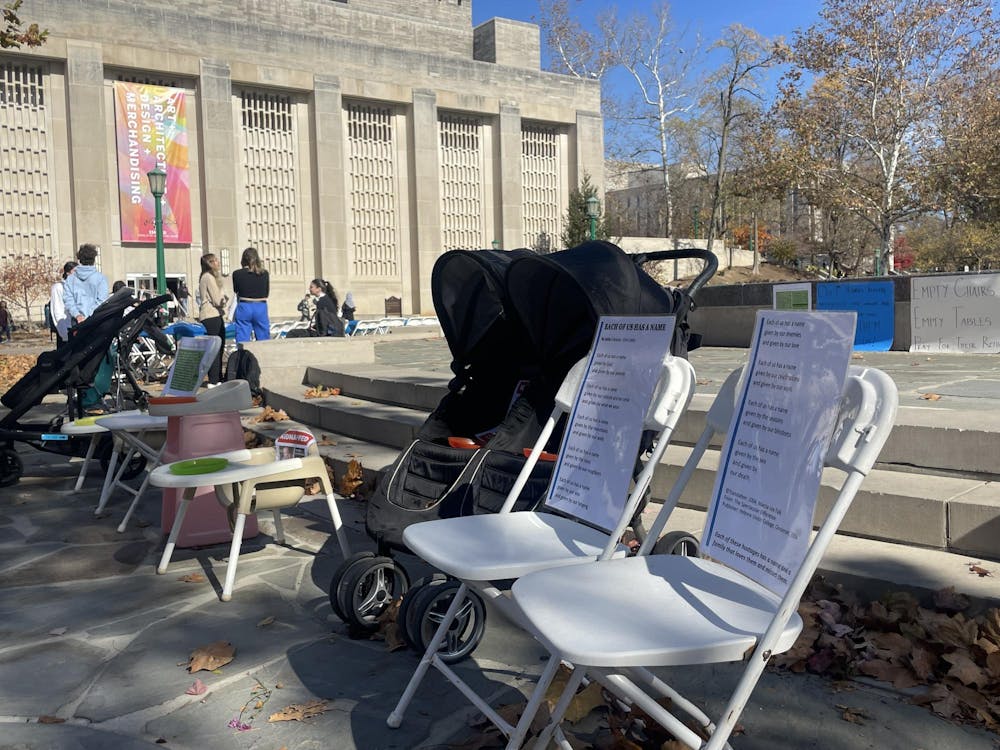IU Hillel hosted a demonstration Thursday afternoon at Showalter Fountain to remember the hostages taken by Hamas since it invaded Israel on Oct. 7. Rows of empty Shabbat tables and strollers encircled Showalter Fountain in remembrance of the hostages and victims of the war.
A police officer on the scene oversaw the safety of the demonstration.
Rabbi Sue Silberberg, executive director of IU Hillel, said the demonstration served to bring awareness to the 242 hostages the Israeli military say were taken hostage when Hamas fighters crossed the border into Israel on Oct. 7 to launch an unprecedented surprise attack. At least 33 of these hostages are children, according to the Israeli government. The New York Times reports the hostages include people from more than 40 countries. The ages of the hostages ranged from babies to 85-years-old.
Hamas has released four of these hostages, including an American Israeli woman and her daughter on Oct. 20 and two Israeli women three days later.
More than 1,400 Israelis and more than 10,000 Palestinians have been killed since the war broke out, according to The New York Times.
Israel and Hamas almost struck a deal that would result in Hamas releasing up to 50 hostages in exchange for pausing the bombardment in response to the Oct. 7 attacks in Israel. According to the New York Times, negotiations halted following Israel’s ground invasion of Gaza on Oct. 27.
Thursday’s demonstration comes after a series of other events on IU’s campus in response to the war including protests and gatherings to mourn lives of Palestinians and Israelis. Many students have expressed increased fear and tension on campus since the war started.
A 388% increase in antisemitic incidents has occurred in the U.S. since Oct. 7 according to the Anti-Defamation League. ADL recorded 312 antisemitic incidents between Oct. 7-23, and 190 were linked to the war.
Silberberg said the demonstration had been planned for more than a week and took about two hours to set up. The strollers and tables included posters with the hostages' names, faces, ages and nationalities, and a QR code for students to scan that led to the site Kidnapped from Israel.
“We wanted to represent as truly as we could, who they are,” Silberberg said.
The empty tables represented Shabbat tables – tables where Jewish people eat during the Jewish day of rest and celebration, Silberberg said. Shabbat lasts from every Friday at sundown until Saturday at sundown. During this time, Jewish people avoid acts of work and burning of fire which can include using technology and using a stove.
“The hostages that are not here with us would probably be preparing for Shabbat,” Silberberg said. “They would all have a place at their family's tables at home, and they are not going to be there.”
Silberberg said a student walking by the demonstration saw one of the photos and started crying.
“It was really sad because she knew the person but didn’t know they had been taken hostage and she found out here,” Silberberg said.
IU student Maya Wasserman said it has been hard as a Jewish student to go about her daily life since the start of the war. Wasserman said one of her friends from high school is in the Israeli army and got kidnapped while on border patrol.
“It is hard to go to classes and live your normal life when your heart is hurting for your family and friends who are there,” Wasserman said.
Tuesday marked one month since the hostages had been kidnapped.
“That was a pretty significant milestone,” Wasserman said. “After a month for a lot of hostages, there is a low chance of them being released.”
IU student Rose Gallatin, who is Jewish, said she is from a community where her camp has a lot of connections to people in Israel. Gallatin said she has been texting her friends in the army to ask if there is anything she can do to help them.
“Scary is the word that I would use,” Gallatin said. “Nobody should have to think about losing the people that they love.”
Gallatin said she is extremely grateful she has a supportive Jewish community on campus.
“There is some tension, and it is high, but it has gotten me much more involved with Hillel, and Chabad and other Jewish things on campus, so that is something good that has come out of this,” Gallatin said. “It is hard to say what is on my mind, because there are a lot of emotions associated with what is going on in the last month.”




